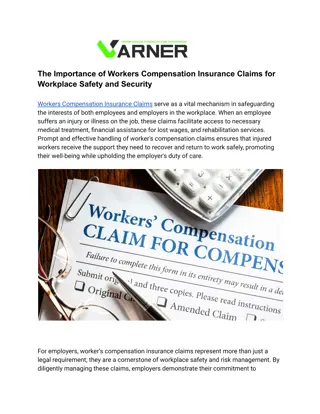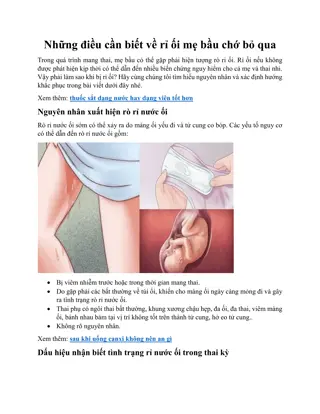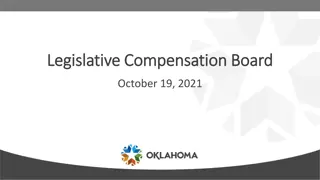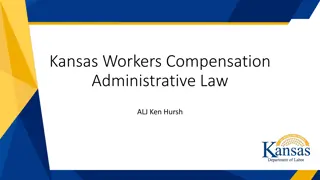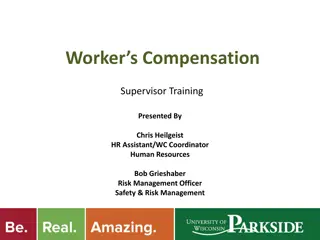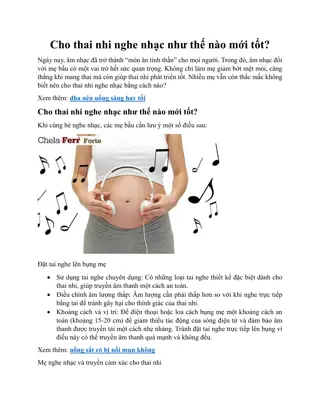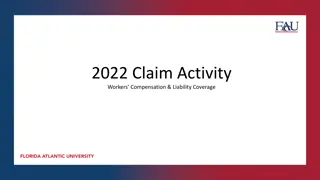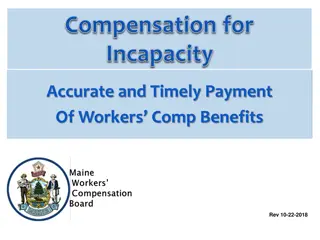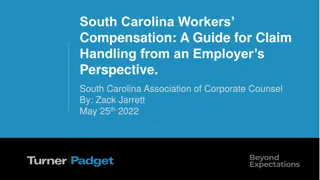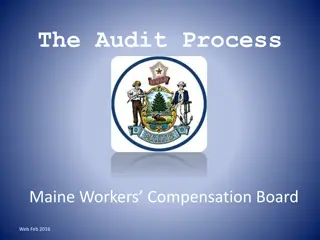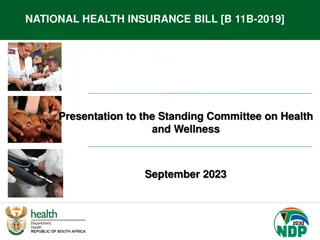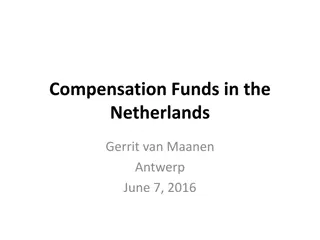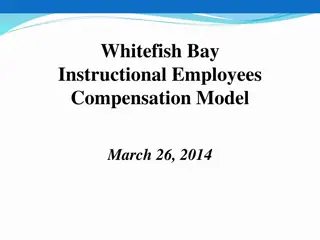Workers' Compensation in the Construction Industry: Addressing NHI Bill Interactions
This presentation by The Federated Employers Mutual Assurance Company examines the impact of the National Health Insurance (NHI) Bill on the Compensation for Occupational Injuries and Diseases Act (COIDA) in the construction industry. FEM's historical background, constitutional rights, and the social security framework in South Africa are key areas of focus in this insightful discussion.
Download Presentation

Please find below an Image/Link to download the presentation.
The content on the website is provided AS IS for your information and personal use only. It may not be sold, licensed, or shared on other websites without obtaining consent from the author. Download presentation by click this link. If you encounter any issues during the download, it is possible that the publisher has removed the file from their server.
E N D
Presentation Transcript
PRESENTATION TO THE PARLIAMENTARY PORTFOLIO COMMITTEE ON HEALTH ON THE NATIONAL HEALTH INSURANCE BILL 14 JULY 2021 Providing Workers Compensation to the construction industry since 1936 Providing Workers Compensation to the construction industry since 1936
INTRODUCTION This presentation in response to the NHI Bill is made by The Federated Employers Mutual Assurance Company (RF) Proprietary Limited ( FEM ). This presentation seeks to address the interaction of the NHI Bill with the Compensation for Occupational Injuries and Diseases Act, 130 of 1993 ( COIDA ). In particular it highlights aspects that need to be considered that are not necessarily addressed in the NHI Bill. Rand Mutual Assurance have made a separate written submission relating to the Impact of the NHI Bill on COIDA. FEM is aligned with the comments and recommendations provided in that document. In certain instances, we have reiterated the specific points that they have provided in their document.
BACKGROUND: FEM FEM was established as a mutual short-term insurer in 1936 and on the introduction of the Workmen s Compensation Act, 1941, was granted a licence to transact workmen s compensation insurance for the construction industry. FEM s business is governed by the Compensation for Occupational Injuries and Diseases Act, 130 of 1993 (COIDA). Its business operations are confined to the insurance of employers against their liabilities under COIDA and extend to any employer falling within subclass 0500 of the Commissioner s industrial classifications for the construction industry. In terms of FEM s Memorandum of Incorporation ( MOI ), the company operates as a mutual short-term insurer and shareholding is effectively restricted to policyholders. The mutual structure of the company is entrenched in non-alterable provisions in the MOI of the company, hence the (RF) designation at the end of the Company s name. FEM is licensed to provide workmen s compensation in terms of Section 30 of COIDA for the construction industry. COIDA cover is paid for by policyholders via insurance contributions to FEM based on assessment rates gazetted by the Minister of Employment and Labour. FEM receives these contributions (premiums) and pays benefits. Rand Mutual Assurance is the other entity that is licensed to conduct COIDA business, for the mining sector and the metal industry. The two entities are hereafter collectively referred to as the Mutuals . All other industries are insured by the Compensation Fund (CF). All reference in this presentation to the CF includes the Mutuals.
THE CONSTITUTION AND COIDA The South African Constitution entrenches through section 27(1)(c) the right of every citizen to have access to social security, including, if they are unable to support themselves and their dependents, appropriate social assistance. In terms of Section 27(2) of the Constitution, the state must take reasonable legislative and other measures, within its available resources, to achieve the progressive realisation of this right. The compensation of employees for occupational injuries and diseases, as governed by COIDA, forms part of the social insurance structure within the social security system in South Africa.
INTERNATIONAL LAW The South African Constitution contains important provisions on the role and importance of international law. South Africa is bound by the standards and provisions of any international laws that it has ratified. South Africa has ratified two of the old International Labour Organisation (ILO) Conventions in the field of occupational injuries and diseases namely: ILO Equality of Treatment (Accident Compensation) Convention, Convention 19 of 1925; and ILO Workmen s Compensation (Occupational Diseases) Convention (Revised), Convention 42 of 1934 Article 1 of Convention 1925 requires equal treatment of nationals from any other ILO Member State, and it states the following: "1. Each Member of the International Labour Organisation which ratifies this Convention undertakes to grant to the nationals of any other Member which shall have ratified the Convention, who suffer personal injury due to industrial accidents happening in its territory or to their dependents, the same treatment in respect of workmen s compensation as it grants to its own nationals. 2. This equality of treatment shall be guaranteed to foreign workers and their dependents without any condition as to residence. With regard to the payments which a Member or its nationals would have to make outside that Member's territory in the application of this principle, the measures to be adopted shall be regulated, if necessary, by special arrangements between the Members concerned." This is entrenched within the provisions of COIDA
OBJECTIVES OF THE CF The primary objective of the CF is to compensate employees for disablement, caused by occupational injuries/diseases sustained/contracted, in the course of their employment, or their dependants for death resulting from such injuries/diseases and to pay for the reasonable medical expenses incurred. The benefits under COIDA include medical care, compensation for temporary total or partial disablement, compensation for permanent disablement, dependants benefits, certain transportation costs, a constant care attendant grant, and a funeral grant. The benefits are funded through annual contributions (premiums) from employers. Employers are obligated to pay contributions, calculated by taking into account the risks to which the employees are exposed to in the specific sector or line of work in which the employee is involved.
PRINCIPLES OF COIDA COIDA is underpinned by a set of principles which serve as a guide to the determination of the policy imperatives of the legislation. These principles are outlined below: No Fault Compensation: All occupational injuries and diseases are covered regardless of fault. The No-fault compensation system dictates that an injured or diseased employee is entitled to compensation without the need to prove that either the employee or employer was at fault for the accident. In exchange for this, employees and employers waive their common law right to sue. Section 35(1) of the COIDA stipulates that: No action shall lie by an employee or any dependant of an employee for the recovery of damages in respect of any occupational injury or disease resulting in the disablement or death of such employee against such employee s employer, and no liability for compensation on the part of such employer shall arise save under the provisions of the COIDA in respect of such disablement or death. Collective Sharing of Liability: The total cost of the CF system is shared by the employers. All premiums are therefore paid to the CF by employers and cannot be deducted from employees salaries.
PRINCIPLES OF COIDA CONTINUED Neutral Governance: The CF is administered outside of the contractual relationship between the employee and the employer to fairly and objectively respond to the needs of employees who are injured or diseased, such as medical care, income replacement and in the case of dependants, fair compensation. Security of payment: The CF and the Reserve Fund were established to guarantee availability of funds for compensation. This is especially pertinent as the only source of funding is assessments from employers.
BENEFITS UNDER COIDA COIDA provides for compensation to the employees under the following circumstances: Accidents that arise out of and in the course of an employee`s employment resulting in a personal injury, illness or death. Fatal cases where an employee dies because of an accident that takes place on duty. Occupational diseases contracted in the workplace due to exposure of the employee to certain agents or conditions found in the work environment.
BENEFITS UNDER COIDA COIDA provides for the following benefits in the event of a workplace accident that result in an injury or a disease: Temporary and Total Disablement (TTD): Compensation is payable to an injured employee during temporary total disablement by way of periodical payments at the rate of 75% of monthly earnings. Permanent Disablement: Compensation for permanent disablement where the degree of disablement is 30% or less takes the form of a lump sum. Compensation for permanent disablement where the degree of disablement is greater than 30% or less takes the form of a pension. An injured employee may also qualify for a Constant Attendance Allowance. Death: Compensation for the death of an employee in the form of a pension. The widow/widower and each child under the age of 18 will receive compensation. A Funeral Benefit is also paid out. Medical Expenses: All reasonable medical expenses incurred by or on behalf of an employee may be defrayed.
COIDA AND MEDICAL EXPENSES In addition to the payment of compensation, COIDA provides for the payment of the medical expenses of employees for treatment of incapacity on account of occupational accidents and diseases. According to section 1 of COIDA, "medical aid" means "medical, surgical or hospital treatment, skilled nursing services, any remedial treatment approved by the Director- General, the supply and repair of any prosthesis or any device necessitated by disablement, and ambulance services where, in the opinion of the Director-General, they were essential. The conveyance of injured employees to receive medical care is also included. An employer must make the necessary conveyance available to any injured employee to a hospital or medical practitioner or from a hospital or medical practitioner to his or her residence. The Director-General must pay the reasonable costs of such transportation. Medical aid payments are made in accordance with a tariff of fees determined by the Director-General, after consultation with the relevant professional bodies, namely, the South African Medical Association, the Chiropractic Association of South Africa, the South African Dental Association and all other relevant healthcare provider Associations. A medical practitioner (healthcare provider) may not recover an amount in excess of that prescribed in the tariff of fees. are gazetted annually. The medical tariffs Medical assessments are also required in determining the eligibility for and extent of compensation to injured employees. This applies both in the context of determining the degree of disablement and the nature of the disease contracted as a result of a work-related accident. COIDA provides for the CF to make payments in relation to these medical assessments and to receive reports from the medical service providers..
COIDA AND MEDICAL EXPENSES The CF places specific emphasis on timeous treatment of injured employees and thus payment of medical serve providers with the primary aim of getting injured employees back into the workplace as soon as possible, failing which the aim is to get the medically assessed as quickly as possible to enable compensation and continuation of income. COIDA provides for medical expenses to be paid for a period of up to 2 years. However in certain circumstances, the payment of medical expenses could extend beyond two years e.g. in the event of occupational diseases or injuries that require long-term treatment. For these reasons, medical expenses are the most significant component of pay-outs made by the CF on an annual basis as illustrated in the graph below Average medical benefits paid per year - R3.4bn
RESPONSE TO THE BILL Overview COIDA in the Bill In terms of the Preamble of the NHI Bill, 2019 the NHI Fund is to be established in order, inter alia, to "ensure financial protection from the costs of health care and provide access to quality health care services by pooling public revenue in order to actively and strategically purchase health care services based on the principles of universality and social solidarity". The NHI Bill, 2019 only refers to the following limited set of repeals and amendments to COIDA:
ELIGIBILITY AS BENEFICIARIES OF THE NHI FUND Section 4 of the NHI Bill prescribes the persons for whom the NHI Fund should purchase comprehensive healthcare. Of relevance from an employee perspective are the following inclusions: South African citizens Permanent residents Refugees Certain categories or individual foreigners determined by the Minister of Home Affairs after consultation with the Minister and the Minister of Finance by notice in the gazette Section 1 of the COIDA describes an employee as follows: "employee" means a person who has entered into or works under a contract of service or of apprenticeship or learnership, with an employer, whether the contract is express or implied, oral or in writing, and whether the remuneration is calculated by time or by work done, or is in cash or in kind, and includes - a) a casual employee employed for the employer's business; b) a director or member of a body corporate who has entered into a contract of service or of apprenticeship or learnership with the body corporate, in so far as he acts within the scope of his employment in terms of such contract; c) a person provided by a Labour broker against payment to a client for the rendering of a service or the performance of work, and for which service or work such person is paid by the Labour broker.
ELIGIBILITY AS BENEFICIARIES OF THE NHI FUND The definition of "employee" in section 1 of COIDA includes the category of migrant workers (including irregular/undocumented migrant workers), while it is not clear what is meant by certain categories of individual foreigners under the NHI Bill. This inclusion of migrant workers is consistent with international laws and ILO Convention 19 which South Africa has ratified Recommendation Based on the above assessment of COIDA, the definition of an employee eligible for COIDA benefits appears to be wider than that of the NHI user. It is recommended that the Bill accommodates all users (employees) who would have been injured or diseased in the course and scope of employment within the country, and particularly in relation to occupational injuries and diseases. This is also consistent with the requirements of International Laws which South Africa has ratified..
UNREGISTERED EMPLOYERS AND THEIR EMPLOYEES Under COIDA, an employer must register with the CF; employers individually liable may be exempt from these requirements by the Director-General. Failure to register constitutes an offence and may have serious consequence, also of a punitive nature. Employees are not required to register with the CF. The right to compensation is provided for in sections 22 and 65 of COIDA. Any employee who falls within the definition of the Act and who meets with an accident resulting in his or her disablement or death, or who contracts an occupational disease, is entitled to compensation subject to the provisions of the Act. This applies irrespective of whether the employee s employer has registered or has paid contributions. If an employee is entitled to compensation in terms of the COIDA, the Director-General or the employer individually liable or the mutual association concerned, as the case may be, is liable for the payment of such compensation. The NHI Bill does not contain a provision expressly stating that membership to the NHI Fund is mandatory. It does however state in Section 5 that an individual must be a registered user to access the healthcare services under the NHI Fund. It is not clear how employees who have not registered with the NHI will be managed. Recommendation: Consideration is required on how injured employees, who are not registered under the NHI Fund, requiring medical treatment or medical assessment in order to be eligible for compensation will be dealt with. Their inability to get medical access may compromise their ability to access compensation benefits under the CF.
ALIGNMENT WITH BENEFITS PROVIDED BY COIDA The Bill proposes that the NHI Fund will provide access to sustainable and affordable health care services. Section 7 states that the health care services will be determined by the Benefits Advisory Committee. Section 38 also makes reference to a Formulary which will be developed and maintained by the Benefits Advisory Committee. The Formulary will be comprised of the Essential Medicine List and Essential Equipment List as well as a list of health-related products used in the delivery of health care services as approved by the Minister in consultation with the National Health Council and the Fund. According to section 1 of COIDA, "medical aid" is defined to mean "medical, surgical or hospital treatment, skilled nursing services, any remedial treatment approved by the Director-General, the supply and repair of any prosthesis or any device necessitated by disablement, and ambulance services where, in the opinion of the Director-General, they were essential." The benefit structure of COIDA includes treatment for all occupational injuries and diseases, through an annual gazetted schedule. The legislation also provides for additional benefits such as assistive devices, dental, spectacles, facial reconstruction, conveyance, treatment of post-traumatic stress disorder aligned with the American Medical Association (AMA) guides, etc that are specific to occupational injuries and diseases. In addition, COIDA also provides for medical assessments, in order to determine eligibility for and the extent of compensation.
ALIGNMENT WITH BENEFITS PROVIDED BY COIDA CONTINUED Further, there are proposed amendments to COIDA that have been issued under the COIDA Amendment Bill. The proposed amendments include the introduction of a programme of rehabilitation, reintegration and return to work for injured and diseased employees. The programme entails three levels of intervention namely: medical, vocational and social rehabilitation. The primary objective is to provide an opportunity to injured or diseased employees to continue to be economically active where possible, and to reintegrate them to society, particularly in instances where they are disabled. This will align, firstly, with South Africa's international obligations and, secondly, with the requirements of the Labour Legislation and assist in addressing the tendency of some employers to dismiss employees on the basis of occupational injuries and diseases. The question remains to what extent the above range of medical aid-related services under COIDA are meant to form part of the health care services . Health care services", is defined to mean: a) health care services, including reproductive health care and emergency medical treatment, contemplated in section 27 of the Constitution; b) basic nutrition and basic health care services contemplated in section 28(1)(c) of the Constitution; c) medical treatment contemplated in section 35(2)(e) of the Constitution; and (d) where applicable, provincial, district and municipal health care services.
THE ROLE OF MEDICAL SERVICE PROVIDERS AND TIMEOUS TREATMENT OF INJURED EMPLOYEES The CF maintains a relationship with medical service providers to ensure that injured employees receive treatment timeously. In addition, the CF aims to pay service providers within 30 days of receipt of valid invoices in order to ensure that medical service providers are willing to treat COIDA cases. Where medical service providers are reluctant to treat injured employees before receipt of payment, we may issue letters of guarantee. The main objective is to ensure that injured employees receive treatment timeously and are able to resume work as soon as possible. Clause 6(d) in the NHI Bill provides that a user of the Fund may not be refused access to health service benefits on "unreasonable grounds". The term "unreasonable grounds" is, however, not defined in the NHI Bill and it is, therefore, unclear under what circumstances the refusal of health services will be reasonable or unreasonable and whom at a health establishment will be charged with deciding when to refuse access to health service benefits. Should an injured employee be refused treatment, this could exacerbate their injury and increase the related compensation costs that are borne by the CF . This increased cost may have to be passed on to employers which may not be sustainable. Clause 6(f) of the NHI Bill stipulates that users of the Fund will be entitled to access health service benefits within a "reasonable time period" albeit that the term "reasonable time period" is not defined in the NHI Bill. In this regard, no benchmarks are referred to in the NHI Bill to determine a "reasonable time period". Clarity is required as to who will determine the standards and what recourse will be available when "reasonable" time periods are exceeded.
THE ROLE OF MEDICAL SERVICE PROVIDERS AND TIMEOUS TREATMENT OF INJURED EMPLOYEES There are at least two fundamental issues that need to be raised: Determination of range of medical aid-related services: Given the fact that it is left to the Benefit Advisory Committee to determine the actual benefits to be provided under the NHI, it is unclear to what extent the medical aid-related services currently available under the COIDA regime, will be available under the NHI. Unsatisfactory treatment of rehabilitation services: Rehabilitation and return-to-work programmes require a holistic approach. The same applies to care that an injured employee may require. In addition to the current framework provisions of CODIA, recently published suggested amending legislation, i.e. Compensation for Occupational Injuries and Diseases Amendment Bill, 2020 (also referred to as the COIDA Amendment Bill, 2020), clearly envisages the provisions of clinical, vocational and social rehabilitation. These terms are separately defined in the COIDA Amendment Bill, which rehabilitation is defined as follows: "'rehabilitation' means measures, services and facilities also in the form of clinical vocational and social rehabilitation provided for in chapter VIIA of the COIDA provided with a view to the reintegration of employees exposed to an occupational injury or disease back into work and to enable them to attain and maintain where reasonable and practicable, maximum independence, full physical, mental, social and vocational rehabilitation and full inclusion and participation in all aspects of life." It is therefore clear that a critical component of health care rehabilitation in particular may become fragmented if the NHI were to take over medical rehabilitation. Recommendation: The health service benefits and Formulary under the NHI Bill should take into account the medical aid and related benefits provided under COIDA to ensure that there is no coverage gap.
THE ROLE OF MEDICAL SERVICE PROVIDERS AND TIMEOUS TREATMENT OF INJURED EMPLOYEES Users of the Fund are required to follow referral pathways in terms of clause 7(2)(d)(ii) of the NHI Bill. The effect of clause 7(2)(d)(ii) appears to be that patients may no longer select their own health care providers or make their own health care treatment decisions. The NHI Bill similarly does not specify whether a user who is already consulting with a particular specialist for a pre-existing condition will be permitted to continue consulting with the aforementioned specialist unless a referral is first obtained in terms of clause 7(2)(d)(ii). This is relevant under COIDA where the nature of the work-related injury or disease may require long- term and specialist medical intervention. With the imposition of referral pathways, injured employees run the risk of not being referred to a specialist at all in the event that the primary health care provider is of the opinion that the referral is not necessary. Furthermore, the NHI Bill provides that a person seeking health service benefits from an accredited and certified service provider or health institution must be registered as a user of the Fund and must present proof of such registration to the service provider or institution in order to secure the health service benefits to which he or she is entitled. The consequences of an employee who has been subjected to an occupational injury or disease but who has not registered as a user of the Fund, or who has not been able to provide proof of such registration, requires consideration. In addition, there are a number of employees who travel for work purposes and may not have access to their registered medical provider. Section 7 allows for the portability of healthcare services to another accredited provider. In certain remote areas , the choice of accredited healthcare service providers may be limited or non-existent.
EMPLOYEES INJURED OUTSIDE OF SOUTH AFRICA Section 23(1)(a) of COIDA states the following: "If an employer carries on business chiefly in the Republic and an employee of his ordinarily employed in the Republic, meets with an accident while temporarily employed outside the Republic, such employee shall, subject to paragraph (c), be entitled to compensation as if the accident had happened in the Republic." As such, employees injured outside of South Africa are entitled to COIDA compensation. The employee may seek medical aid in that country and then be reimbursed by the CF. Under the NHI, it seems that this will not be covered. Recommendation It is possible that the scope of healthcare benefits provided for under the NHI could potentially be less than that provided for under the COIDA legislation. It is proposed that the Bill accommodates the unique benefit structure of COIDA as it currently benefits injured employees.
TRANSITION ARRANGEMENTS The details of how the transition will be managed on the introduction of NHI is not clear. For example, certain accidents may have a long tail of medical payments, the employee may already be registered with a certain doctor, and sometimes the employees are in outlying rural areas. It is not clear whether the employee can continue treatment with their doctor, or if a suitable doctor will be available to them in their vicinity. In addition, employers would have already paid the premium for the accident that gave rise to the medical treatment a long time ago.
GOVERNANCE STRUCTURE NHI Board The composition of the NHI Board will be based on experts in relevant fields which may include: healthcare service financing, health economics, public health planning, monitoring and evaluation, law, actuarial sciences, information technology and communication. In addition, the following advisory committees will be established: Benefits Advisory Committee Healthcare Benefits Pricing Committee Stakeholder Advisory Committee
GOVERNANCE STRUCTURE CONTINUED Compensation Fund (CF) Board Section 12 of the COIDA sets out the functions of the Board and includes the following: The Board shall advise the Minister regarding- 1. matters of policy arising out of or in connection with the application of this Act; (1) the nature and extent of the benefits that shall be payable to employees or dependents of employees, including the adjustment of existing pensions; (2) the appointment of assessors; (3) the amendment of this Act. (4) The Board may at the request of the Director-General advise him regarding the performance of a particular aspect of his functions. 2. In essence, the CF Board is responsible for advising the Minister of Employment and Labour on pricing premiums payable by employers and benefits for employees with occupational injuries or diseases.
GOVERNANCE STRUCTURE CONTINUED Clause 13 of the NHI Bill foresees that the composition of the NHI Board will be made up of experts in relevant fields. No provision is made for the Compensation Commissioner or representatives of the Compensation Fund to be part of the NHI Board. This has the implication that the interests of, in particular employees and employers might not be sufficiently reflected in the NHI Board structure, in so far as compensation for occupational injuries and diseases are concerned. Recommendation We propose the inclusion of at least one representative from the Compensation Fund or nominated member of the Mutual Associations. This will enable the NHI Fund to consider matters that fall under or connected to COIDA. As such, a representation from relevant stakeholders will provide the NHI Fund with necessary information in the development of benefits or services specific to employees under the COIDA. Alternatively, it is recommended that a Committee be set up between the NHI Fund and the CF to consider matters that impact on the CF
COIDA: OTHER SECTIONS REQUIRING CONSIDERATION The proposed changes to COIDA by the NHI Bill require that the structures and functions of the CF change substantially. Fundamentally, the Bill removes in its entirety provisioning of medical aid, payment of medical costs and medical examination. There are additional sections of COIDA that would require amendments as a result. The Bill focuses on the following section of COIDA. Change to the definition of compensation to exclude medical benefits in section 1 of COIDA. Section 16(a) of COIDA relating to the application of funds to medical benefits was removed. Remove the reference to medical aid in section 22 which deals with the right to medical treatment even in the case of wilful misconduct. The changes to section 42 relate to the need for a diagnostic medical examination. The repeal of section 73 dealing with the payment and limitations of medical expenses. The repeal of section 75 dealing with limitation of medical treatment if treatment given was sufficient.
SOURCES OF INCOME FOR THE NHI Section (48) of the NHI proposes raising money from any source which the Fund could be legally entitled to. It is unclear how the portion of the current employer assessments towards COIDA related to medical services will be determined while ensuring the CF is still able to adequately provide for other benefits payable under COIDA. COIDA - Revenue generation All employers must register with the Compensation Fund. According to COIDA, an employer is any person who employs an employee. The revenue of the Compensation Fund consists mainly of annual assessments paid by the registered employers on the basis of a percentage of the annual earnings of their employees. COIDA makes provision for a minimum assessment to ensure that the assessment is not less than the administration costs. The COIDA assessment allows for specific rates, which covers all components of the COIDA benefits including the payment of medical costs. These rates are determined by taking into account the risks to which the employees are exposed to in the specific sector or line of work in which the employee is involved. There are currently cross-subsidies between the different benefit components as some fixed costs may be shared across the different benefit components. If some benefit components are carved out, there will be lower cross-subsidies and the sum of the premium of different components could be higher than a consolidated premium for all benefit components.
SOURCES OF INCOME FOR THE NHI Recommendation It is recommended that clarity be provided on the manner in which the funds for the NHI will be sourced. It is also important that sufficient funds are retained by the CF to continue to support the other benefits provided by COIDA and to avoid charging higher premiums to employers.
NHI IMPACT ON COMPENSATION BENEFITS UNDER COIDA Most of the COIDA benefits are interrelated and are dependent on the required information to be able to manage the case. This would include the medical information in relation to the injury so this information flow between NHI and CF is crucial. Even determining if an accident is compensable in terms of COIDA is reliant on several factors which would include requiring access to medical reports on pre-existing conditions and current conditions. There will need to be service level standards in submission of medical reports to the CF as assessment of claims is dependent on receipt of medical reports, otherwise there may be potential challenges in assessing the limitation of liability of mutual associations. It is unclear who would cover the costs of this. In addition, rehabilitation and return-to-work programmes require a holistic approach. The same applies to care that an injured employee may require. However, this may become fragmented if the NHI were to take over medical rehabilitation. If this is not closely managed, it may lead to additional costs for the CF in the form of higher Permanent Disability, Total and Temporary Disability and pension payments. Recommendation To ensure that a proper, comprehensive and detailed alignment of NHI Bill and COIDA provisions are undertaken. To ensure that liability for the COIDA claim is adjudicated properly, an integrated information system would need to be put in place. This will also facilitate the flow of medical information from the NHI to the CF to facilitate the process of compensation for disablement or death.
NHI IMPACT ON COMPENSATION BENEFITS UNDER COIDA CONTINUED Any failure on the part of the NHI Fund to approve medicalaid (or the equivalent as part of comprehensive health service benefits ) could potentially result in the CF being forced to pay compensation for a longer period of time, as well as that recovery of the employee could be delayed. The CF would need to be able to continue to perform monitoring on service providers to avoid overtreatment/over-servicing of patients. It is also critical to closely manage injured workers to ensure that they are able to return to work as soon as possible, to reduce the burden of unemployment on the South African economy. The Director-General may penalise employers with poor accident records over a period of time. The Director-General may also give a rebate on assessments to any employer whose accident record is more favourable than that of employers in a similar business. Rebates and loadings have been highly effective in managing the number of occupational accidents. Should the medical aid component be carved out of the premiums, then this would result in lower rebates and loadings and as such, may not be as effective at managing the number of occupational accidents . Under COIDA, provision is also made for the utilisation of funds to prevent occupational accidents and diseases, promote occupational health and safety, and provide return-to-work and rehabilitation services. It is important that sufficient funds continue to be available for this initiative as it is highly effective in managing the number and severity of accidents in the workplace.
CONCLUSION FEM is mindful of the fact that the right to healthcare and the right to social security are constitutional rights that should always be protected. Considering this, we are committed to the successful implementation of the NHI and will continue to engage all relevant stakeholders in pursuit of this policy initiative whilst at the same time ensuring that all claimants for occupational injuries and diseases continue to be timeously and fairly compensated. Consideration should be given on the impact of NHI on COIDA as the latter advances employees rights to social insurance and also governs the relationship between employers and employees in terms of work-related accidents. To this end, ongoing engagement with the CF on an optimal structure is recommended.
Head Office, 2nd Floor, Bldg. Oxford & Glenhove, 114 Oxford Rd, Houghton Estate, 2198 Private Bag 87109, Houghton, 2041 Tel: (011) 359 4300 - Fax: (011) 359 4302 info@fema.co.za - www.fema.co.za







